Commodities, products that are easily exchanged worldwide

Honduras, the country of many key industries
8 de May de 2024
The steel industry in Mexico is experiencing a significant boom
2 de August de 2024Commodities are basic products for the world economy due to their easy exchange in the global market. A commodity, a term used primarily in the financial or commercial context, is a tangible material that can be sold or bought.
Generally, they are energy, agricultural, or mineral products. Some examples are oil, natural gas, gold, silver, wheat, corn, coffee, sugar, and copper, among others. These are used for the manufacture of other more refined products.
One of the most important characteristics they share is uniformity in quality. This means that a barrel of oil is, in essence, the same everywhere in the world, which makes trading it a faster negotiation compared to others.
Many industries depend on them as they are used as inputs in different types of services or goods. Because of this, commodities are considered highly volatile assets, which implies that their prices can experience significant fluctuations throughout the year.
That is why risk mitigation management makes a difference for agents in this sector. Climate phenomena, economic changes, and trade agreements are some of the factors that can directly influence its variation.
To minimize these risks in uncertain scenarios, certain aspects must be taken into account when negotiating. These include setting future purchase or sale values, reviewing company certifications, having a second option for buyers, and being up to date on daily trends to identify opportunities.
In Latin America, Brazil has become a crucial country for commodity logistics since it is one of the main food producers, specifically, it is responsible for the supply of a large part of the world’s grain production. The same growth trend that occurred last year is expected to continue in 2024.




